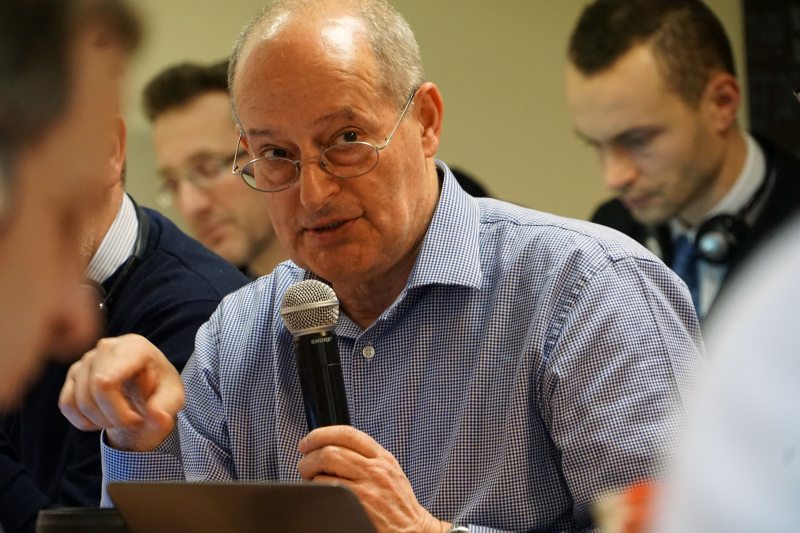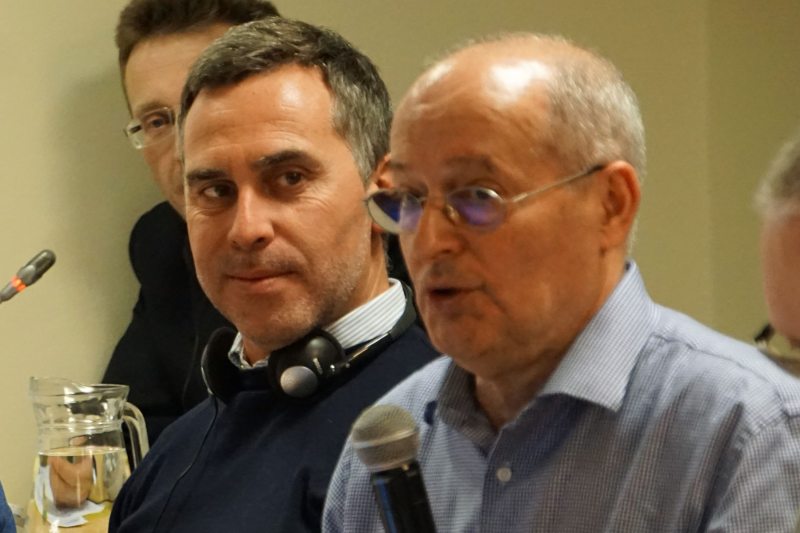Miklós Haraszti: International scrutiny of the situation in Belarus has to be continued
The last report of the UN Special Rapporteur on Belarus will stress the need of renewing the country mandate, Miklós Haraszti said during a meeting with Belarusian and international human rights activists, which took place at the Belarusian Human Rights House in Vilnius on January 31.
Mr. Haraszti’s mandate expires in late October. By that time, he is expected to prepare his final report and present it at the June session of the Human Rights Council in Geneva, and then at the UN General Assembly in New York.
The Special Rapporteur told Viasna that the report will not only cover the current situation as of March 2018, but also offer an overview of the six-year period of his mandate with evidence of the cyclical nature of human rights violations in Belarus.

- Miklós Haraszti, UN Special Rapporteur on Belarus, during a meeting at the Belarusian Human Rights House in Vilnius. January 31, 2018
“The year of 2017 was a year of great regression in the human rights situation of Belarus. But not a surprising one, because those who observed, monitored the human rights situation in Belarus for the whole period of the presidency of Lukashenka have already noticed before that it has a cyclic character, that it about 4-5 years after it again becomes tragic with mass authoritarian repression, authoritarian both in the sense of illegal, extralegal, unexplained, unwarranted, but also in the sense that it is done by the authorities themselves, like police and others. Then comes a period of hopes, which is never bringing, unfortunately, legal improvements in the systemic sense. It’s simply not as bad as it used to be before,” Mr. Haraszti said.
The UN Rapporteur says he could observe such a cycle during his mandate.
“My mandate was prompted by the 2010 December violence, mass arrests, political prisoners being taken, and it ended in a sense with the same things in February and March 2017. With the same things again: mass police violence against peaceful demonstrators, taking of political prisoners. And then the expectations started again that maybe they can be released and the situation will change. So, my mandate has now a double perspective. One is periodic, long-term regression and the unchanged legal systemic dimension. And the other is the actual number of people who have to be rescued from the revenge of the authorities.”
The list of violations in the field of human rights in Belarus remains unchanged, the Rapporteur says.
“The long-term demands of the society and simply of decency are the same: acknowledge the unacknowledged civil society organizations, Viasna among them, stop the permission-based system of political life in Belarus, which for many generations now already have lamed the prospect of life. Many generations of people in Belarus have grown up without enjoying the freedoms that the European identity would demand: freedom of speech, freedom of association, freedom from the death penalty, freedom of the media, pluralism of the media and many other rights, because the list of violations does not stop at first-generation individual, political human rights. It extends to labor rights, gender rights, freedom from torture in prison. And in my last report I had to observe the obvious: that it is clearly the reason why this is happening because of the totally centralized command-line power in Belarus, because of total lack of power sharing, because of total lack of division of labor between the different arms of public like the judiciary, the legislation and the executive, like civil society and the media. In the proper European setup, these are separated, sometimes in discussion, in clash, sometimes in cooperation, But this are the guarantees that can help people retain their freedoms. So this is what is lacking here. And it is hard to imagine how a major, substantive improvement can happen without changing these power structures clearly against the democratic norms.”

- Alexandre Girard, a representative of the Office of the UN High Commissioner for Human Rights, and Miklós Haraszti, UN Special Rapporteur on Belarus, during a meeting at the Belarusian Human Rights House in Vilnius. January 31, 2018
The final months of Mr. Haraszti’s tenure as the Special Rapporteur will focus on the need for a further extension of the mandate. Meanwhile, more and more countries, being influenced by Russia and China, argue that the UN watchdog mechanisms should not include country mandates, Alexandre Girard, a representative of the Office of the High Commissioner for Human Rights, said during the meeting. Last year, the renewal of the mandate of the Special Rapporteur on Belarus was supported by as few as 18 votes, with 8 votes against and 21 abstained.
Miklós Haraszti believes that there are no reasons for dropping the mandate this year.
“I am clearly of the opinion that the mandate should continue. It flows very logically from what I’ve just said. The situation has not changed. The underlying legal setup has not changed. The political will to changes is still missing. The fact that Belarus now is in a difficult geopolitical situation is not a reason to preserve stability on the basis of Lukashenka’s understanding. Lukashenka understands stability as total power for the incumbent President and lack of freedoms. But true stability of a country lies in the enjoyment of freedoms and the knowledge of the people that they can change government in a peaceful way following existent rules. So if the present-day rules don’t allow peaceful change of government, then international experience says that then it is more grown for violence. The real reason for instability lies in the fact that generations after generations cannot enjoy those freedoms. International scrutiny of the situation has to be continued.”
Since Belarus is not a member of the Council of Europe, the UN mandate is the only way to do this international scrutiny, the experts says.
“I strongly recommend that it should continue. And my last report to UN Human Rights Council will be exactly about that subject,” he said.
The mandate of the UN Special Rapporteur on the human rights situation in Belarus was introduced in 2012 after the mass repression following the 2010 presidential election. The government of Belarus does not recognize the mandate and refuses to interact with the Rapporteur. During the six years in office, Miklós Haraszti has not had the opportunity to visit Belarus, since it requires an official invitation of the authorities. However, in July 2017, Haraszti arrived in Minsk on invitation of the OSCE to take part in the activities of the 26th session of the OSCE PA. He also attended the Parallel Civil Society Forum. Haraszti expressed hope that his unofficial visit to Belarus was the first step towards the official recognition of the UN Special Rapporteur’s mandate. However, the Belarusian Foreign Ministry said that the position of the official Minsk was not subject to changes.

















